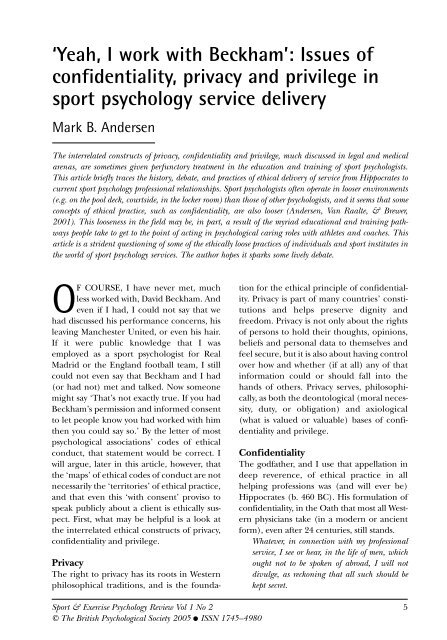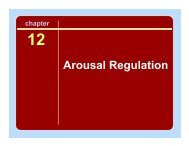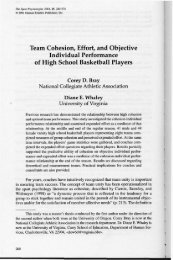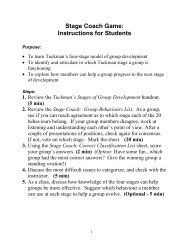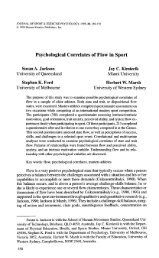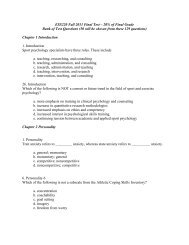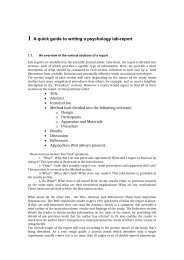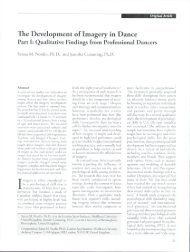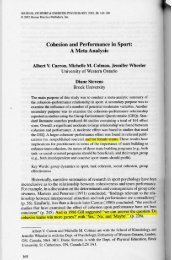Sport and Exercise Psychology Review - Sport Psychology Goes to ...
Sport and Exercise Psychology Review - Sport Psychology Goes to ...
Sport and Exercise Psychology Review - Sport Psychology Goes to ...
You also want an ePaper? Increase the reach of your titles
YUMPU automatically turns print PDFs into web optimized ePapers that Google loves.
‘Yeah, I work with Beckham’: Issues of<br />
confidentiality, privacy <strong>and</strong> privilege in<br />
sport psychology service delivery<br />
Mark B. Andersen<br />
The interrelated constructs of privacy, confidentiality <strong>and</strong> privilege, much discussed in legal <strong>and</strong> medical<br />
arenas, are sometimes given perfunc<strong>to</strong>ry treatment in the education <strong>and</strong> training of sport psychologists.<br />
This article briefly traces the his<strong>to</strong>ry, debate, <strong>and</strong> practices of ethical delivery of service from Hippocrates <strong>to</strong><br />
current sport psychology professional relationships. <strong>Sport</strong> psychologists often operate in looser environments<br />
(e.g. on the pool deck, courtside, in the locker room) than those of other psychologists, <strong>and</strong> it seems that some<br />
concepts of ethical practice, such as confidentiality, are also looser (Andersen, Van Raalte, & Brewer,<br />
2001). This looseness in the field may be, in part, a result of the myriad educational <strong>and</strong> training pathways<br />
people take <strong>to</strong> get <strong>to</strong> the point of acting in psychological caring roles with athletes <strong>and</strong> coaches. This<br />
article is a strident questioning of some of the ethically loose practices of individuals <strong>and</strong> sport institutes in<br />
the world of sport psychology services. The author hopes it sparks some lively debate.<br />
OF COURSE, I have never met, much<br />
less worked with, David Beckham. And<br />
even if I had, I could not say that we<br />
had discussed his performance concerns, his<br />
leaving Manchester United, or even his hair.<br />
If it were public knowledge that I was<br />
employed as a sport psychologist for Real<br />
Madrid or the Engl<strong>and</strong> football team, I still<br />
could not even say that Beckham <strong>and</strong> I had<br />
(or had not) met <strong>and</strong> talked. Now someone<br />
might say ‘That’s not exactly true. If you had<br />
Beckham’s permission <strong>and</strong> informed consent<br />
<strong>to</strong> let people know you had worked with him<br />
then you could say so.’ By the letter of most<br />
psychological associations’ codes of ethical<br />
conduct, that statement would be correct. I<br />
will argue, later in this article, however, that<br />
the ‘maps’ of ethical codes of conduct are not<br />
necessarily the ‘terri<strong>to</strong>ries’ of ethical practice,<br />
<strong>and</strong> that even this ‘with consent’ proviso <strong>to</strong><br />
speak publicly about a client is ethically suspect.<br />
First, what may be helpful is a look at<br />
the interrelated ethical constructs of privacy,<br />
confidentiality <strong>and</strong> privilege.<br />
Privacy<br />
The right <strong>to</strong> privacy has its roots in Western<br />
philosophical traditions, <strong>and</strong> is the foundation<br />
for the ethical principle of confidentiality.<br />
Privacy is part of many countries’ constitutions<br />
<strong>and</strong> helps preserve dignity <strong>and</strong><br />
freedom. Privacy is not only about the rights<br />
of persons <strong>to</strong> hold their thoughts, opinions,<br />
beliefs <strong>and</strong> personal data <strong>to</strong> themselves <strong>and</strong><br />
feel secure, but it is also about having control<br />
over how <strong>and</strong> whether (if at all) any of that<br />
information could or should fall in<strong>to</strong> the<br />
h<strong>and</strong>s of others. Privacy serves, philosophically,<br />
as both the deon<strong>to</strong>logical (moral necessity,<br />
duty, or obligation) <strong>and</strong> axiological<br />
(what is valued or valuable) bases of confidentiality<br />
<strong>and</strong> privilege.<br />
Confidentiality<br />
The godfather, <strong>and</strong> I use that appellation in<br />
deep reverence, of ethical practice in all<br />
helping professions was (<strong>and</strong> will ever be)<br />
Hippocrates (b. 460 BC). His formulation of<br />
confidentiality, in the Oath that most all Western<br />
physicians take (in a modern or ancient<br />
form), even after 24 centuries, still st<strong>and</strong>s.<br />
Whatever, in connection with my professional<br />
service, I see or hear, in the life of men, which<br />
ought not <strong>to</strong> be spoken of abroad, I will not<br />
divulge, as reckoning that all such should be<br />
kept secret.<br />
<strong>Sport</strong> & <strong>Exercise</strong> <strong>Psychology</strong> <strong>Review</strong> Vol 1 No 2 5<br />
© The British Psychological Society 2005 ● ISSN 1745–4980


